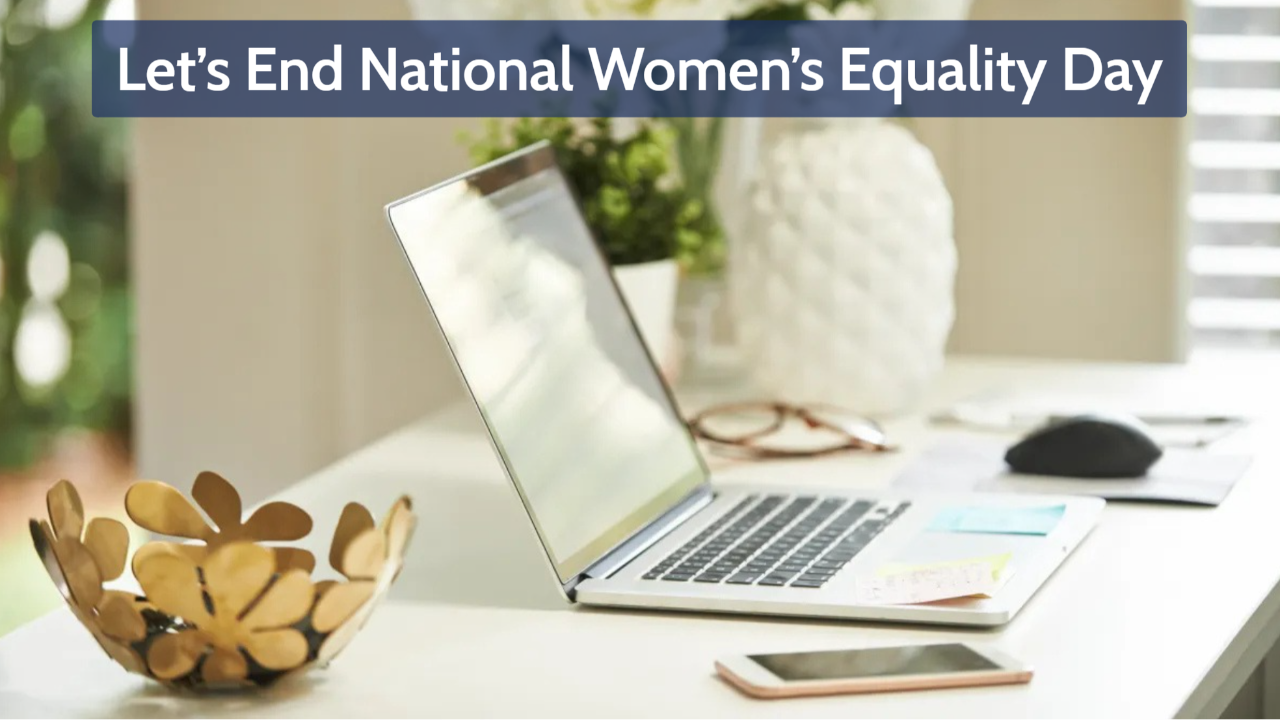Let’s End National Women’s Equality Day

Published in the Hartford Courant on August 26, 2025
National Women’s Equality Day, observed on August 26, marks the adoption of the19th Amendment in 1920, which granted women the right to vote – 144 years late.
Women have been playing catch-up ever since, and nowhere is that more evident than in the workplace.
Last year, the gender wage gap widened for the first time in two decades; women today earn 83 cents on men’s dollar for equivalent work. They fall behind men at the first level of promotion and, according to an expansive McKinsey/LeanIn.Org study, are 17 percent less likely to be promoted than men, at every level.
Similarly, despite some hard-fought gains for women in the C-suite, the “executive table” still has a dramatic dearth of women seated at it and the number is poised to decline further because, according to another McKinsey study, the pipeline that supplies promotable women-candidates is shrinking.
A major contributor to this shrink is women – particularly mothers and caregivers – choosing to start their own business rather than swim upstream in an established one. In recent articles and newscasts, this has been celebrated as a “win” and, on the surface, it might appear like one: Women create the workplace they want, gain agency over their work and family lives, and continue to contribute to the economy and their bank accounts.
But despite these perceived benefits, the rise in women entrepreneurship negatively impacts them and the economy: women lose income, long-term financial security, and industry influence while companies lose proven talent, institutional knowledge, future women-leaders (from their already shrinking pipelines), and profits – because companies with more senior women are widely proven to be more profitable.
For most women, starting a company or “hanging a shingle” is less of a choice and more of a fallback plan that, ultimately, leaves them further behind. Rather than celebrating women who leave corporate America to strike out on their own, we should be giving them fewer reasons to leave – like better/equal pay, nimbler career pathways, increased opportunity in revenue-producing roles, and more flexible work options.
Technology giant, ServiceNow, for example, gives women good reasons to join the company and stay. It offers generous family leave policies, a modern flexible culture, transparent hiring and promotion metrics, active employe “belonging’ initiatives, and near-perfect global gender pay equity. Recently, I interviewed the company’s Chief Workforce Innovation Officer, Karen Pavlin, to learn more about their best practices and share that knowledge with other business leaders in my upcoming book.
After our call, however, I walked away with something different and better. Karen shared interesting details about ServiceNow’s culture and programs – including an exciting new one centered on employee-manager “no fly zone” contracts – but it was an incidental personal story that stuck. Karen began her career at Xerox Corporation working for then-sales manager, Bill McDermott. “I like to call Bill my ‘anchor leader.’” she told me. “He was that one person for me who set the tone and the culture and the expectation that teams should be reflective of their customers.”
That formative experience told a young Karen that she should be one among women, not the only token woman. “While other teams were mostly men, ours was 50-50, gender parity. So that kind of crystallized and became my norm.” (It’s worth noting here that the team was a consistent top-producer.) Karen carried that expectation forward at Xerox, then Accenture, and now at ServiceNow where she was recruited three years ago by her old boss (and my old colleague) Bill McDermott, the company’s dynamic and beloved CEO. “I’m one of few women in business today who can say that, over a career of 30+ years, for the majority of the time, I’ve worked under female CEO’s – Anne Mulcahy and Ursula Burns at Xerox, and Julie Sweet at Accenture. But it all started with Bill.”
This is an important distinction and I’m glad she made it. The Mulcahys, Burns’, and Sweets of the world are few, stuck at roughly 10 percent of Fortune 500 CEOs for the last three years and showing no signs of upward movement. Based on their numbers, they simply don’t have the power or influence to substantially change the workplace. But their male counterparts do, and they have lots to gain by doing it. So, on this National Women’s Equality Day, I invite them to:
1. Assess their teams and organizations to determine if (and begin to ensure that) women are well represented and supported at all levels and in all functions.
2. Complete a company-wide pay audit to uncover (and address) gender inequities.
3. Compile a list of women in the senior leadership pipeline and make sure it is proportionate to the list of men.
As in Karen’s case, just one manager can make a difference. But many together might just render National Women’s Equality Day obsolete.
Susan Rietano Davey is a longtime career and workplace expert whose global learning and consulting company, Prepare to Launch, LLC, is based in Avon, Conn. She helps women and caregivers navigate work-life transitions, and instructs companies on how to attract, retain, develop, and advance the best female talent. This piece includes material from a business leadership book she is writing on closing workplace gender gaps to strengthen teams and grow the bottom line.
